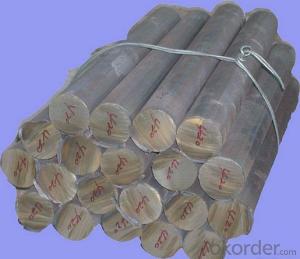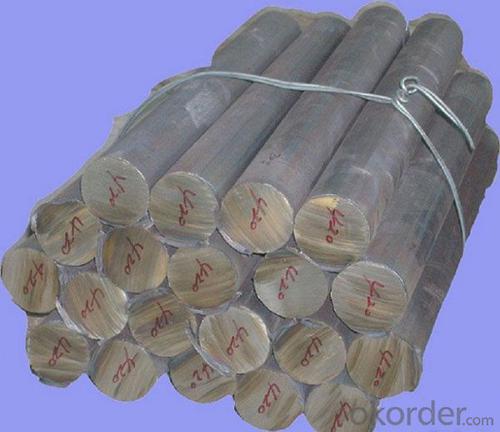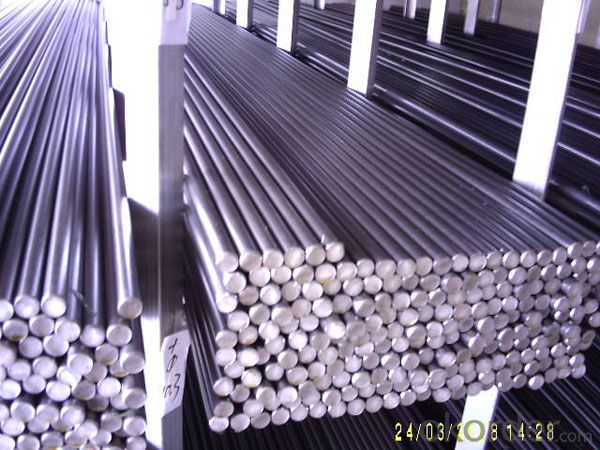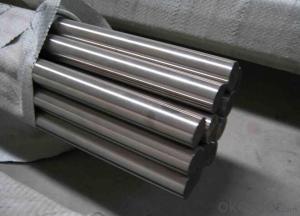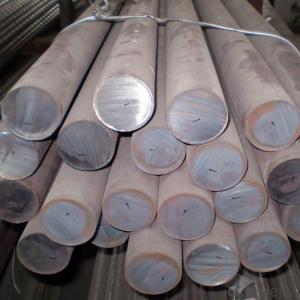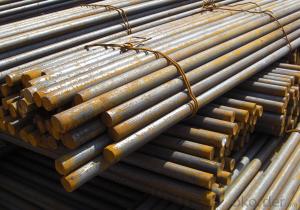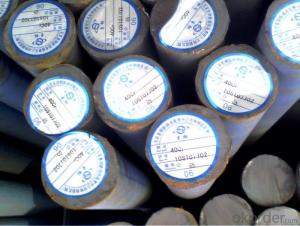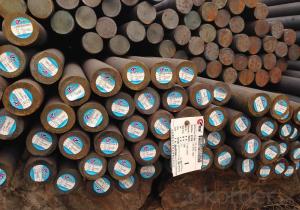Alloy Steel Bar 25MoCr4 Steel Round Bar
- Loading Port:
- China main port
- Payment Terms:
- TT OR LC
- Min Order Qty:
- 25 m.t.
- Supply Capability:
- 10000 m.t./month
OKorder Service Pledge
OKorder Financial Service
You Might Also Like
Specification
Designation by Standards
| Brand Name | LH No. | Mat. No. | DIN | EN | AISI |
| 25MOCR4 | 782 | 1.7325 | 25MoCr4 | - | 8625 |
Chemical Composition (in weight %)
| C | Si | Mn | Cr | Mo | Ni | V | W | Others |
| 0.25 | 0.30 | 0.70 | 0.50 | 0.50 | - | - | - | - |
Mechanical properties
1.7325, DIN 25MoCr4, AISI 8625 Mechanical properties,Our production completely according to the 1.7325, DIN 25MoCr4, AISI 8625 standards to meet the 1.7325, DIN 25MoCr4, AISI 8625 mechanical performance, can also according to the customer request, to meet the requirements of customers of 1.7325, DIN 25MoCr4, AISI 8625 mechanical properties.
Heat treatment
1.7325, DIN 25MoCr4, AISI 8625 Heat treatment,Our production completely according to the 1.7325, DIN 25MoCr4, AISI 8625 standards to meet the 1.7325, DIN 25MoCr4, AISI 8625 Heat treatment, can also according to the customer request, to meet the requirements of customers of 1.7325, DIN 25MoCr4, AISI 8625 Heat treatment.
Machining
1.7325, DIN 25MoCr4, AISI 8625 Machining,Our production completely according to the 1.7325, DIN 25MoCr4, AISI 8625 standards to meet the 1.7325, DIN 25MoCr4, AISI 8625 Machining, can also according to the customer request, to meet the requirements of customers of 1.7325, DIN 25MoCr4, AISI 8625 Machining.
Welding performance
1.7325, DIN 25MoCr4, AISI 8625 Welding performance,Our production completely according to the 1.7325, DIN 25MoCr4, AISI 8625 standards to meet the 1.7325, DIN 25MoCr4, AISI 8625 Welding performance, can also according to the customer request, to meet the requirements of customers of 1.7325, DIN 25MoCr4, AISI 8625 Welding performance.
Product show
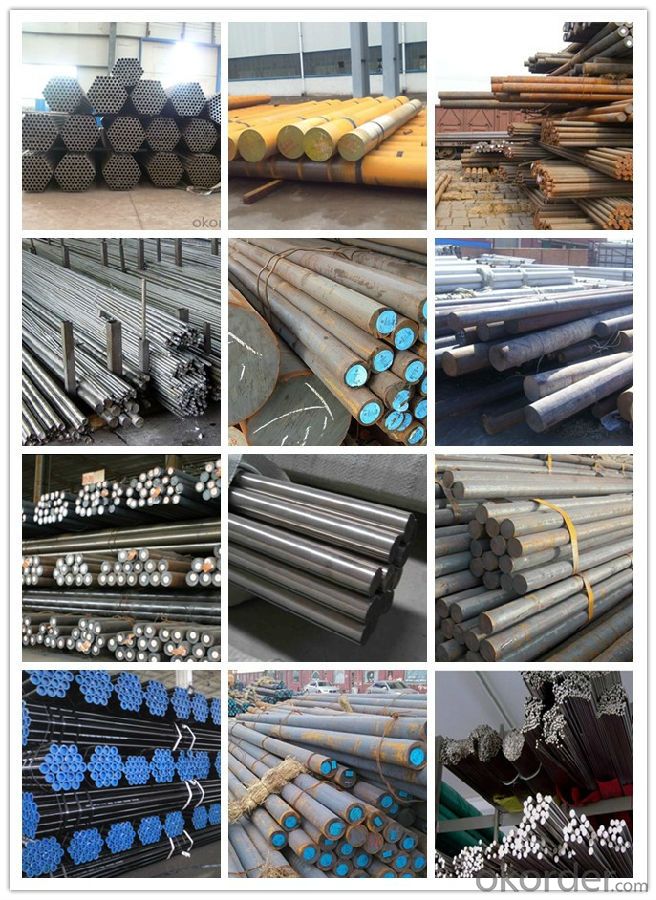
Workshop show
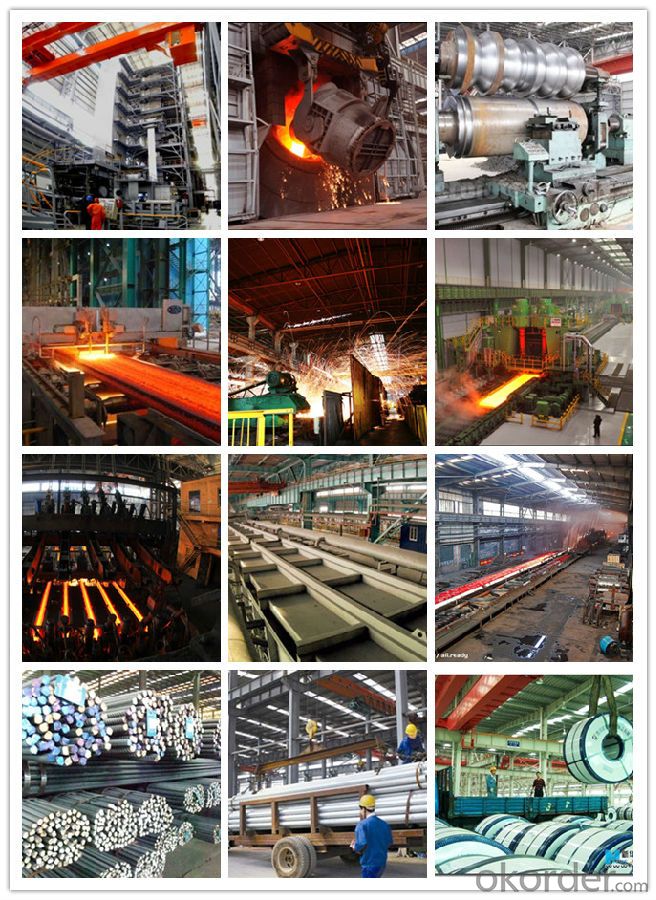
- Q: How is wear-resistant alloy steel used in the production of mining equipment?
- Wear-resistant alloy steel is commonly used in the production of mining equipment due to its exceptional durability and resistance to abrasion and impact. It is utilized in components such as crusher liners, grinding media, buckets, and drill bits to withstand the harsh conditions of mining operations, where rocks, ores, and minerals can cause significant wear and tear. By using wear-resistant alloy steel, mining equipment can operate for longer periods without the need for frequent replacements, resulting in improved productivity and reduced maintenance costs.
- Q: What are the different applications of high-speed special steel?
- High-speed special steel is a type of steel that is specifically designed to withstand high temperatures and maintain its hardness at high speeds. It has a wide range of applications across various industries due to its unique properties. Some of the different applications of high-speed special steel include: 1. Cutting Tools: High-speed special steel is widely used in the manufacturing of cutting tools such as drills, milling cutters, taps, and saw blades. Its excellent hardness, heat resistance, and wear resistance make it ideal for machining operations that involve high temperatures and high-speed cutting. 2. Aerospace Industry: The aerospace industry extensively utilizes high-speed special steel in the production of aircraft components. It is used for manufacturing turbine blades, engine parts, and other critical components that require high strength, high temperature resistance, and excellent fatigue resistance. 3. Automotive Industry: High-speed special steel finds its application in the automotive industry, particularly in the manufacturing of engine components, gears, and bearings. Its ability to withstand high temperatures, resist wear, and provide strength makes it suitable for various automotive applications. 4. Power Generation: High-speed special steel is used in power generation industries such as thermal power plants, nuclear power plants, and wind energy. It is used for manufacturing turbine blades, rotors, and other components that operate at high temperatures and high rotational speeds. 5. Tool and Die Making: High-speed special steel is widely used in tool and die making industries where precision and durability are crucial. It is used for producing molds, dies, punches, and other tooling components that require high strength, wear resistance, and toughness. 6. Medical Instruments: High-speed special steel is increasingly being used in the medical field for manufacturing surgical instruments, dental tools, and implants. Its corrosion resistance, high strength, and biocompatibility make it suitable for medical applications. 7. Industrial Machinery: High-speed special steel is used in various industrial machinery applications such as bearings, gears, shafts, and cutting tools. Its ability to withstand high temperatures, resist wear, and provide strength contributes to the efficiency and reliability of industrial equipment. In conclusion, high-speed special steel finds numerous applications across industries. Its unique properties such as high temperature resistance, hardness, wear resistance, and strength make it an essential material for cutting tools, aerospace components, automotive parts, power generation equipment, tool and die making, medical instruments, and industrial machinery.
- Q: Can special steel be used in the production of springs for automotive suspension?
- Yes, special steel can be used in the production of springs for automotive suspension. Special steel, such as alloy steel or high carbon steel, is often preferred due to its superior strength, durability, and resistance to fatigue. These properties make it well-suited for withstanding the heavy loads and harsh conditions experienced by automotive suspension systems.
- Q: How does nitriding improve the wear resistance of special steel?
- Nitriding improves the wear resistance of special steel by introducing nitrogen into the surface of the material, forming a hard layer of iron nitrides. This hard layer increases the surface hardness and reduces the friction between the material and other surfaces, resulting in enhanced resistance to wear and improved performance in high-stress environments.
- Q: What are the specific requirements for special steel used in the food processing industry?
- The specific requirements for special steel used in the food processing industry include being resistant to corrosion, easy to clean and sanitize, non-reactive with food products, and compliant with food safety regulations. It should also have high strength and durability to withstand heavy usage and frequent cleaning.
- Q: What are the challenges in recycling special steel?
- One of the main challenges in recycling special steel is the complexity of its composition. Special steel often contains various alloying elements and additives that can make the recycling process more difficult. These elements need to be carefully identified and separated in order to maintain the desired properties of the recycled steel. Additionally, special steel may have undergone specific heat treatments or surface coatings, which further complicate the recycling process. Proper sorting, identification, and treatment techniques are necessary to overcome these challenges and ensure the successful recycling of special steel.
- Q: Can special steel be used for making renewable energy equipment?
- Making renewable energy equipment is possible using special steel. Special steel, also referred to as high-performance or alloy steel, possesses various properties that make it appropriate for use in different renewable energy applications. For instance, in wind energy, special steel finds utility in crafting wind turbine components, including rotor blades, tower structures, and drive train systems. The durability and longevity of these components are ensured by the high strength and corrosion resistance of special steel, as they are consistently exposed to harsh weather conditions and mechanical stress. In solar energy, special steel can be employed in the construction of solar panels, support structures, and tracking systems. The material's exceptional thermal conductivity and resistance to deformation make it an ideal choice for effectively capturing and converting solar energy into electricity. Moreover, special steel can be utilized in the production of hydroelectric power equipment, such as turbine blades, runners, and penstocks. These components are designed to withstand the forces and pressures associated with water power generation, and special steel's high tensile strength and resistance to erosion and cavitation make it suitable for this purpose. Furthermore, in the realm of biomass energy, special steel can be used in the fabrication of bioenergy plants and equipment. Its ability to withstand high temperatures and resist corrosion makes it suitable for handling the corrosive substances and high temperatures involved in the biomass conversion process. Overall, special steel's unique combination of strength, durability, corrosion resistance, and thermal properties makes it an excellent option for manufacturing renewable energy equipment, thereby contributing to the development and sustainability of the renewable energy industry.
- Q: Can special steel be used in the rubber manufacturing industry?
- Yes, special steel can be used in the rubber manufacturing industry. Special steel is often used to create molds, tools, and equipment that are used in the production of rubber products. It is valued for its strength, durability, and resistance to wear and tear, making it suitable for various applications in the rubber manufacturing process.
- Q: Can special steel be used in the production of surgical instruments?
- Yes, special steel can be used in the production of surgical instruments. Special steel alloys, such as stainless steel, are commonly used due to their desirable properties like corrosion resistance, strength, and their ability to be easily sterilized. These characteristics make special steel an ideal material for surgical instruments that require high precision and durability.
- Q: What are the different surface protection methods for special steel?
- There are several surface protection methods for special steel, including galvanization, coating with protective paints or varnishes, electroplating, and applying corrosion-resistant alloys or metals. These methods help prevent rust, corrosion, and other forms of damage, ensuring the longevity and durability of the special steel.
Send your message to us
Alloy Steel Bar 25MoCr4 Steel Round Bar
- Loading Port:
- China main port
- Payment Terms:
- TT OR LC
- Min Order Qty:
- 25 m.t.
- Supply Capability:
- 10000 m.t./month
OKorder Service Pledge
OKorder Financial Service
Similar products
Hot products
Hot Searches
Related keywords
